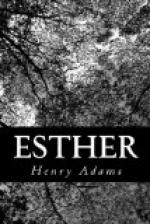Yet Esther felt little like giving strength to any one. As she returned to the sick-room and slipped back into the chair which Catherine quitted, the image of Hazard faded from her mind, and the idea that he could help her, except by his sympathy and friendship, never entered it. After a time her father opened his eyes again and looked at her. She bent over him, and he whispered: “Give me your hand!” She took his hand, and for some time he lay with his eyes open, as though watching her. She could only wonder what was in his mind; perhaps disconnected dreams with intervals of partial consciousness, as now, followed by more vague visions and hurrying phantasms; but she imagined that he had meant not so much to ask for the strength of her hand as to give her die will and courage of his own, and she felt only the wish that he might not doubt her answer to the call. Although he soon dozed again, she did not alter her position, but sat hour after hour, only making way for the nurse who came to give him stimulants which had less and less effect. Her watch ended at two o’clock, when she sent Catherine to bed, but remained herself until the gray dawn had passed and the sun was high in the heavens. She meant her father to know, as long as he knew any thing, that her hand was in his. Not until the doctor assured her that he was no longer conscious, did her long walk into the shadow of death at last end. When Mrs. Murray came, she found Esther still there, her face paler than ever, with dark rings round her eyes, and looking worn and old. As she spoke, her eyes constantly filled with tears, and her nerves were strung up to a tension which made her aunt promptly intervene and insist on her taking rest. Esther obeyed like a worn-out child.
So died William Dudley, and was buried under the ice and snow of winter, while his daughter went on alone to meet the buffets of life. It was in the first days of February that Esther looked about her and seemed to feel that the world had changed. She said to herself that youth was gone. What was she to do with middle-life? At twenty-six to be alone, with no one to interpose as much as a shadow across her path, was a strange sensation; it made her dizzy, as though she were a solitary bird flying through mid-air, and as she looked ahead on her aerial path, could see no tie more human than that which bound her to Andromeda and Orion.
To this moral strain was added the reaction from physical fatigue. For a week or two after her father’s death, Esther felt languid, weary and listless. She could not sleep. A voice, a bar of music, the sight of any thing unusual, affected her deeply. She could not get back to her regular interests. First came the funeral with its inevitable depression and fatigue; then came days of vacancy, with no appetite for work and no chance for amusement. She took refuge in trifles, but the needle and scissors are terrible weapons for cutting out and trimming not so




